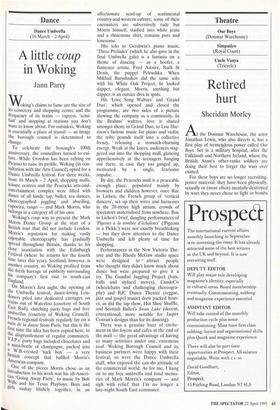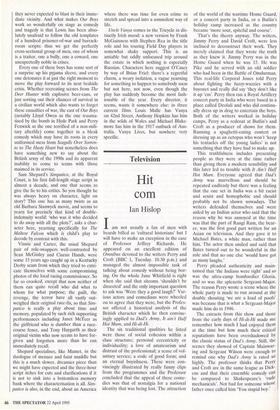Theatre
Our Boys (Donmar Warehouse)
Simpatico (Royal Court) Uncle Vanya (Tricycle)
Retired hurt
Sheridan Morley
At the Donmar Warehouse, the actor Jonathan Lewis, who also directs it, has a first play of tremettdous.power called Our Boys. Set in a military hospital, after the Falklands and Northern Ireland, where the British Army's other-ranks soldiers are doing their best to forget the wars ever existed.
For these boys are no longer recruiting- poster material: they have been physically, sexually or (most often) mentally destroyed by wars they never chose to fight or bombs they never expected to blast in their imme- diate vicinity. And what makes Our Boys work so wonderfully on stage as comedy and tragedy is that Lewis has been abso- lutely unafraid to follow the old templates of a hundred prisoner-of-war and barrack- room scripts: thus we get the perfectly cross-sectional group of men, one of whom is a traitor, one a bully, one a coward, one unexpectedly noble in crises.
Every one of these boys has some sort of a surprise up his pyjama sleeve, and every one detonates it at just the right moment to move the play forward to its next bedside crisis. Whether recreating scenes from The Deer Hunter with explosive beer-cans, or just sorting out their chances of survival in a civilian world which also wants to forget these casualties of war, the cast of Our Boys (notably Lloyd Owen as the one trauma- tised by the bomb in Hyde Park and Perry Fenwick as the one terrified of a non-mili- tary afterlife) come together in a bleak comedy which may have its roots in every uniformed mess from Seagulls Over Sorren- to to The Hasty Heart but nonetheless does have something new to say about the British army of the 1990s and its apparent inability to come to terms with those maimed in its service.
Sam Shepard's Simpatico, at the Royal Court, is his first full-length stage script in almost a decade, and one that seems to give the lie to his critics. So you thought he was always heavy on character, light on story? This one has as many twists as an old Barbara Stanwyck movie, and seems to yearn for precisely that kind of double- indemnity world: 'who was it who decided to do away with all the plots?', asks a char- acter here, yearning specifically for The Maltese Falcon which is child's play to decode by contrast with this.
Vinnie and Carter, the usual Shepard pair of role-swappers well-contrasted by Sean McGinley and Ciaran Hands, were some 15 years ago caught up in a Kentucky Derby scam from which they tried to extri- cate themselves with some compromising photos of the local racing commissioner. So far so crooked, except that now neither of them can quite recall who did what to whom for what purpose; the guilt, the revenge, the terror have all vastly out- weighed their original race-fix, so that Sim- patico is really a play about time and memory, populated by such rich supporting performances including Janet McTeer as the girlfriend who is dumber than a race- course fence, and Tony Haygarth as their original victim who now seems to have for- given and forgotten more than he can immediately recall.
Shepard specialises, like Mamet, in the duologue of menace and faint muddle but this is a much slower, dreamier piece than we might have expected and the three-hour script itches for cuts and clarifications if it is not to sink into a bottomless memory bank where the characterisation is all. Sim- patico is also, in the end, about an America
where there was time for even crime to stretch and spread into a somnolent way of life.
Uncle Vanya comes to the Tricycle in dis- tinctly Irish mood: a new version by Frank McGuinness with Stephen Rea in the title role and his touring Field Day players in somewhat shaky support. This is an amiable but oddly unfocused trip around the estate in which nothing is especially Russian. Characters here suggest O'Casey by way of Brian Friel: there's a regretful charm, a weary isolation, a vague yearning for something to happen to somebody soon but not here, not now, even though the play has suddenly become the most fash- ionable of the year. Every director, it seems, wants it somewhere else: in three current films Louis Malle has Vanya on 42nd Street, Anthony Hopkins has him in the wilds of Wales and Michael Blake- more has him in the 1917 outback of Aus- tralia. Vanya Lives, but nowhere very specific.



























































 Previous page
Previous page